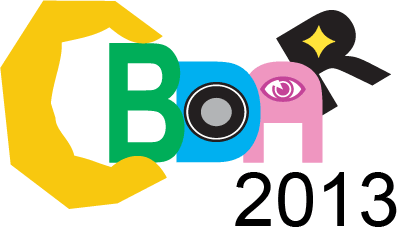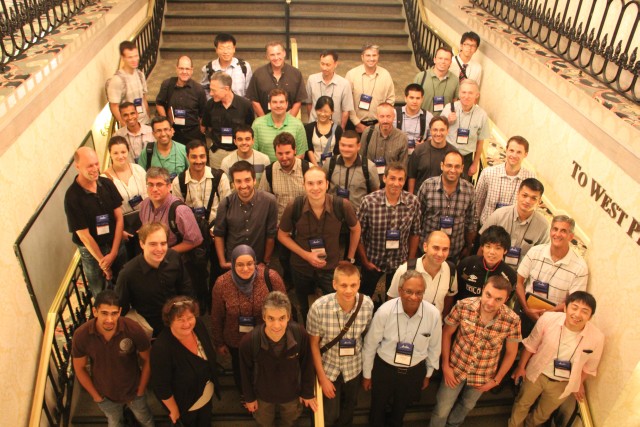CBDAR2013 is a workshop of ICDAR2013.
Latest News
| April, 2014 | The Post-proceedings containing 14 revised full papers have been published. |
| September 22, 2013 | Slides of Keynote Talk by Dr. Kai Kunze (Osaka Prefecture University) have been available. |
| September 22, 2013 | Slides of opening and discussion groups (including closing) have been available. |
| September 22, 2013 | Photos of the workshop have been available. |
| August 23, 2013 | The workshop successfully finished with 60+ participants. Thank you very much for your participation! |
| August 15, 2013 | Program Booklet being distributed at the workshop site has been available. |
| August 5, 2013 | Presentation instruction have been available. |
| August 5, 2013 | Timetable and program have been available. |
| May 14, 2013 | Call for Demo is added. |
| May 13, 2013 | Paper submission due date is extended. |
| April 16, 2013 | The submission information is available. |
| October 4, 2012 | The website is temporarily open. |
Important Dates
| Abstract Submission Due: | May 20, 2013, 23:59 Pacific Time |
| Paper Submission Due: | |
| Author Notification: | |
| Camera-Ready Paper Due: | July 15, 2013 |
Workshop Overview
Background
Pervasive use of camera phones and hand-held digital still and video cameras have let us discover that image-based recording of information by just pressing a button is really convenient. In addition to imaging faces and scenes, people have started capturing documents to preserve contents. Cameras, which are now functioning as personal copiers, will soon produce a huge number of imaged documents that are beyond manual handling. Although traditional techniques developed in the field of document analysis and recognition provide us with a good starting point, they cannot be directly used on camera captured images. This leads us to a new sub-field of research.
CBDAR is the international workshop with a special focus on camera captured documents. Presentation of up-to-date issues and techniques as well as discussions on future directions will boost research in this relatively new area. Participants will share experiences and problems in the area.
Topics of Interest
include, but are not limited to:
- camera based acquisition
- restoration of camera captured documents (dewarping, deblurring, etc.)
- image degradation models for camera captured characters/documents
- document image quality analysis
- character segmentation/recognition from scene images
- layout analysis for camera captured documents
- video of text / text in video
- document image retrieval
- devices and algorithms for camera-based document analysis and recognition
- device constrained techniques and algorithms
- performance evaluation and metrics
- applications such as translation, reading text for the blind, etc
Keynote Talk

- Dr. Kai Kunze (Osaka Prefecture University)
- With over eight years experience in the Ubiquitous Computing research field, Kai Kunze works as a Research Assistant Professor at the Intelligent Media Processing Group, Osaka Prefecture University, directed by Prof. Koichi Kise. He received a Summa Cum Laude for his phD thesis (University Passau). His work experience includes internships at the Palo Alto Research Center (PARC), Sunlabs Europe and the Research Department of the German Stock Exchange. His major research contributions are in pervasive computing, especially activity recognition. His current research includes the exploration of knowledge acquisition tasks, combining computer vision and other pervasive sensing approaches, with a focus on reading activities and crowd based sensing.
- Title: Real-life Activity Recognition - Focus on Recognizing Reading Activities
- Abstract:
Most applications in intelligent environments so far strongly rely on specific sensor combinations at predefined positions, orientations etc. While this might be acceptable for some application domains (e.g. industry), it hinders the wide adoption of pervasive computing. How can we extract high level information about human actions and complex real world situations from heterogeneous ensembles of simple, often unreliable sensors embedded in commodity devices?
This talk mostly focuses on how to use body-worn devices for activity recognition in general, and how to combine them with infrastructure sensing and computer vision approaches for a specific high level human activity, namely better understanding knowledge acquisition (e.g. recognizing reading activities).
We discuss how placement variations of electronic appliances carried by the user influence the possibility of using sensors integrated in those appliances for human activity recognition. I categorize possible variations into four classes: environmental placements, placement on different body parts (e.g. jacket pocket on the chest, vs. a hip holster vs. the trousers pocket), small displacement within a given coarse location (e.g. device shifting in a pocket), and different orientations.For each of these variations, I give an overview of our efforts to deal with them.
In the second part of the talk, we combine several pervasive sensing approaches (computer vision, motion-based activity recognition etc.) to tackle the problem of recognizing and classifying knowledge acquisition tasks with a special focus on reading. We discuss which sensing modalities can be used for digital and offline reading recognition, as well as how to combine them dynamically.
Workshop Format
This will be a 100% participation, one-day, single-track workshop featuring keynote talks, oral/poster presentations, a demo session, and a discussion group.
Submission Information
CBDAR2013 invites the submission of original, previously unpublished work and welcomes, with some restrictions, submissions which are closely related to work submitted to ICDAR2013. CBDAR work should differ materially from ICDAR presentation(s) in any of several ways:
- recent results too late for the ICDAR deadline
- motivations and broader implications of work presented in more detail than in your ICDAR paper(s)
- methodological issues facing the CBDAR community
- proposals for community-wide data sets, experiments, competitions, web sites, etc.
Papers should not exceed 6 printed pages in IEEE-CS format which is the same format as the main conference. This workshop employs single-blind review, in which referees remain anonymous for the authors throughout the process.
Click here to go to the submission site.

Call for Demos
We would like to invite you to participate in a demonstration session at CBDAR 2013. If you would like to participate it, we will provide a table and standard power. Please provide us (cbdar2013-inquiry __[[at]]__ ml.osakafu-u.ac.jp) with the title of your demo, your name and affiliation by July 5th.
In order to be considered for a demonstration you must complete the following by July 5th:
1) Register to CBDAR 2013 (if you have not done yet)
2) Provide a one page abstract of your proposed demo together with your request. The abstract, which will appear on the workshop website, should contain a title, the presenters names and your affiliation.
Proceedings
Electronic as well as printed copies of the workshop proceedings containing all contributed papers will be distributed at the workshop. After the workshop, revised versions of selected papers will be published in Springer LNCS series as post-proceedings.
Registration Fee
Registration fee is $100.00. Please register on http://www.icdar2013.org/attendees/registration. Registration fee includes proceedings and coffee breaks. Lunch is not included.
Presentation Instruction
Oral Presentation
Each oral presentation has 20 min. including QA. Please check the length of your presentation and consider to finish your presentation 3-5 min. advance in order to accept questions.
Poster Presentation
The same poster boards are used as ICDAR. Guidelines can be found at http://www.icdar2013.org/papers/presenters.
Demo Presentation
A table and standard power in addition to a poster board for each demo presentation are available. If you need special requirements for your demo presentation, please let us know.












